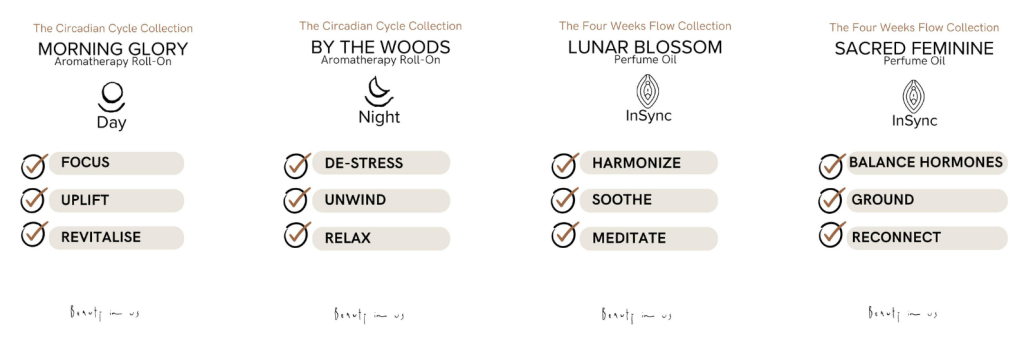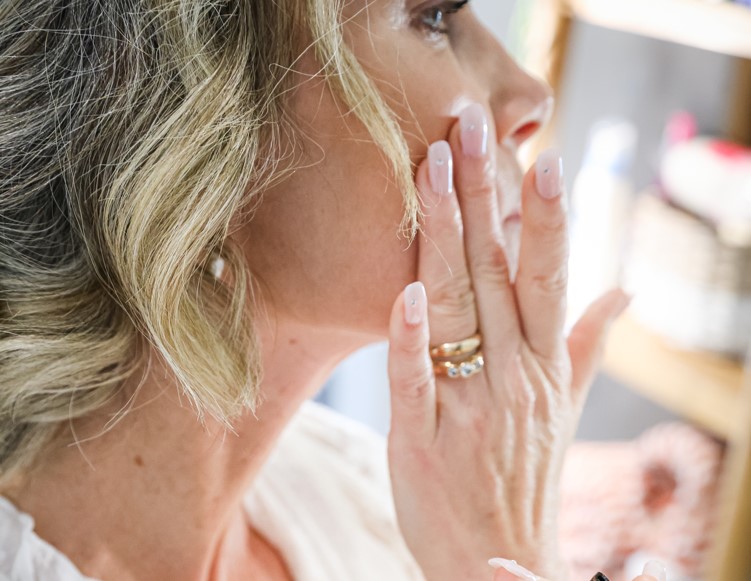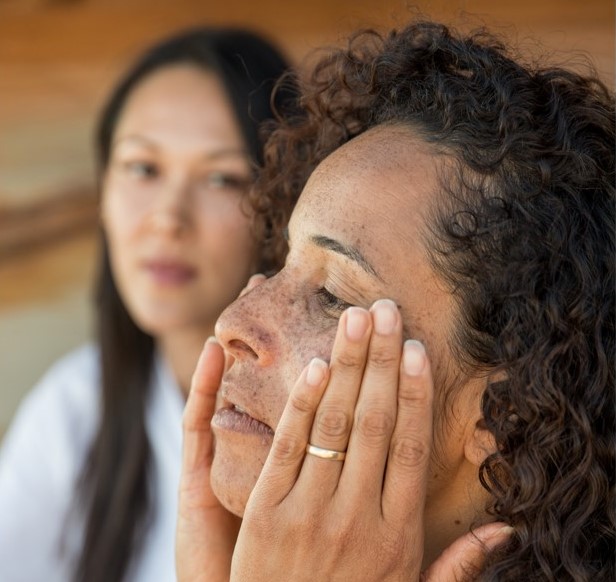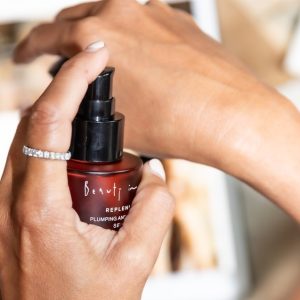Are you feeling overwhelmed? Whether it’s acute stress (short term stress), episodic (regular acute stress) or chronic stress (long term), your skin will tell.
While acute stress mostly manifests in unprofound ways like skin flushing, episodic and chronic stress can affect your skin in more severe ways, including acne, psoriasis, eczema, dryness, and premature ageing.
This means, you might be following your skincare routine religiously, but if you are not managing your stress well, you might still find yourself battling persistent skin issues.
The sad truth, however, is that in the current world, avoiding stress is almost impossible. So, how do you save your skin from something almost impossible to avoid?
It takes work, but it’s doable. And with the mindfulness rituals provided by Beauty in Us, combined with our organic skincare products, you might just achieve your desired balance, resilience and radiance inside out – in your mind and skin.
To achieve this holistic wellness, let’s first understand the connection between the mind and the skin as well as the various ways stress can impact your skin.
The Connection Between The Mind and Skin

Our body works as one big interconnected system, and the link between the skin and the brain is even stronger than you might think. For example, a study on Brain-Skin Connection: Stress, Inflammation and Skin Aging in 20141, found that stress can delay wound healing by affecting inflammation, proliferation, and remodelling phases.
The same study revealed that chronic stress can lead to long-term skin damage, including premature ageing and increased susceptibility to skin diseases. Board certified dermatologist, Keira Barr MD, FAAD2, also explains that our skin is not only affected by stress hormones but also produces them.
This makes the skin more prone to inflammation, itching, infections, and irritation when we’re going through stressful moments. Even though science might seem distant or hard to grasp, we all experience it in our everyday lives. Think about how your skin might break out during a big presentation, or how eczema flares up when you’re feeling overwhelmed.
Our emotions and mental state are always working hand-in-hand with what’s happening on the surface. This link underscores the importance of taking care of our minds in order to see the benefits on our skin
A Deeper Understanding of the Impact of Stress on Your Skin
1. Increased Production of Stress Hormones
When you’re stressed, your body releases cortisol, often referred to as the stress hormone 3. This hormone has a direct impact on your skin:
- Increased Oil Production: Cortisol stimulates sebaceous (oil) glands, leading to an overproduction of oil. This excess oil can clog pores, contributing to acne breakouts, blackheads, and whiteheads.
- Weakening of the Skin Barrier: Cortisol weakens the skin’s natural barrier, making it more susceptible to dryness and irritation. When your skin barrier is compromised, it allows moisture to escape, which can result in dehydration, dullness, and more sensitivity to environmental aggressors.
2. Inflammation and Immune Response
Stress triggers inflammation throughout the body, including in the skin:
- Chronic Skin Conditions: If you have eczema, psoriasis, or rosacea, you might have noticed that they tend to flare up during stressful periods. Stress-induced inflammation can worsen symptoms, causing more redness, itching, and irritation4.
- Slow Wound Healing: Our skin has a self-repair mechanism. However, stress can affect the immune system, slowing down this ability. This means wounds, blemishes, and irritations take longer to heal, potentially leading to scarring or prolonged discomfort.
3. Changes in Skin Sensitivity
Stress can also mess the skin’s sensitivity, making it more reactive to everyday irritants, such as certain skincare products, environmental factors like pollution, or even clothing materials. This heightened sensitivity is not good for our sin because it can result in rashes, itching, or burning sensations.
4. Worsening of Skin Conditions
If you are already suffering from chronic skin conditions, stress can worsen the symptoms:
- Eczema: Stress increases inflammation and damages the skin barrier, leading to more frequent and severe eczema flare-ups. This can result in dry, itchy patches that become increasingly difficult to manage.
- Psoriasis: Stress is a well-known trigger for psoriasis, a condition where the skin produces too many cells, leading to raised, scaly patches. Stress can cause these patches to spread or become more irritated.
5. Premature Ageing
Stress is a major contributor to premature ageing of the skin. It accelerates the formation of fine lines, wrinkles, and sagging5 by:
- Breaking Down Collagen: High levels of cortisol can break down collagen and elastin, the proteins responsible for keeping your skin firm and smooth. This leads to the loss of skin elasticity and the development of wrinkles.
- Formation of Free Radicals: Stress promotes the production of free radicals, unstable molecules that damage skin cells and accelerate ageing.
6. Skin Dullness and Uneven Tone
We’ve heard of the “fight or flight” response during stressful moments. So when this happens, blood is redirected away from the skin and other non-essential organs to the muscles and heart. This can lead to:
- Dull, Tired Skin: When the skin receives less blood flow, it also gets less oxygen and essential nutrients, which can lead to a dull, washed-out appearance.
- Dark Circles and Puffiness: Stress can cause the blood vessels under the skin, particularly around the eyes, to dilate. This can make dark circles and puffiness more pronounced.
While these are the main ways stress impacts your skin, there are other minor ones like heat rash and hair and nail problems. Stress also affects the gut health, causing serious digestive problems.
How to Manage The Effects of Stress on Your Skin

Stress affects your brain, and like in most cases, we can train and communicate with our brains in order to react a certain way. Some effective practices for managing stress and hence its effects on the skin are:
1. Adopt Stress-Relief Practices
Managing stress starts with calming your mind. Incorporating relaxation techniques into your daily routine can help:
- Mindfulness and Meditation: Even just 10 minutes a day of mindfulness or meditation can lower cortisol levels, reducing the negative impact on your skin.
- Deep Breathing Exercises: Taking deep, slow breaths can instantly calm your nervous system, helping to manage sudden stress responses.
- Exercise: Regular physical activity releases endorphins, which are natural mood lifters. Exercise also improves blood circulation, helping your skin look healthy and vibrant.
- Aromatherapy: As simple as it may sound, some essential oil blends can help you recenter yourself. Aromatherapy has been proven to ease tension but it can also help you stay in tune with your body’s natural rhythms while easing the tension that builds up during the day. Our new line of aromatherapy blends is designed with this in mind:

- Morning Glory is ideal for the start of your day—it helps you focus, feel uplifted, and adds a little spark to get you going.
- By the Woods, a good companion when you’re winding down, helps you let go of the day’s stress and gently prepares you for a peaceful night.
- Lunar Blossom is a beautiful perfume oil that’s all about finding your calm—it’s meant for moments of meditation or whenever you need to pause and harmonise.
- Sacred Feminine is a grounding, hormone-balancing blend that helps you reconnect and find your centre, especially during times when you need a little extra support.
2. Get Enough Sleep
Sleep is critical for skin health and a good sleep routine is among the most effective practices for de-stressing and achieving overall health. Aim for at least 7 hours of sleep. Your skin repairs itself while you sleep, so lack of rest can lead to dull, tired-looking skin and more breakouts.
Having a consistent sleep routine that involves you going to bed and waking up at the same time every day also helps regulate your body’s stress response, which benefits your skin.
3. Follow a Skincare Routine with Clean, Organic Ingredients
Stress can make your skin more sensitive, so it’s important to be gentle with your skincare routine:
- Hydrate: Use a moisturiser or face oils that help restore your skin’s barrier and keep it hydrated, especially if stress is making your skin dry.
- Use Soothing Ingredients: Look for products with calming and organic ingredients, which can reduce redness and inflammation. Beauty In Us formulates organic skincare products that are effective but also gentle and soothing, even to sensitive and stressed out skin.
- Avoid Harsh and Synthetic Ingredients: Skip the harsh scrubs or alcohol-based products, as they can irritate already stressed-out skin. Most synthetic skincare products often contain ingredients that may be harsh on stressed out skin.
4. Eat a Balanced Diet
Your diet plays a role in both managing stress and supporting skin health. Eat plenty of fruits and vegetables that are rich in antioxidants (like berries, spinach, and sweet potatoes), which help combat the free radicals that stress produces.
Omega-3 fatty acids found in foods like salmon, flaxseeds, and walnuts also help reduce inflammation and keep your skin looking supple.
It also goes without saying that drinking plenty of water will keep your skin hydrated and flush out toxins that stress can increase.
5. Limit Exposure to Environmental Stressors
Stress weakens the skin’s defences, making it more vulnerable to external stressors:
- Wear Natural Sunscreen Daily: UV rays can further damage stressed skin, so make sure to apply sunscreen every day, even when it’s cloudy.
- Protect from Pollution and Blue Light: If you live in a city, pollution can aggravate skin already stressed by internal factors. Use antioxidant products to help protect your skin from free radicals coming from the environment.
6. Avoid Stress-Induced Habits
Stress can lead to face-touching or picking at pimples, which introduces bacteria and causes inflammation or scarring. Some people also overeat to forget about the stress. Be very intentional about not stress eating, especially sugary or processed foods, as it can contribute to acne and inflammation.
7. Seek Professional Help
If stress is seriously affecting your skin and mental well-being, it may be time to get professional support. A dermatologist can help you develop a skincare routine that addresses stress-induced skin issues and a therapist or counsellor can help you manage stress, which will benefit both your mind and your skin in the long run.
Beauty In Us’ Blueprint on How to Manage the Effects of Stress on Your Skin

More than anything, Beauty in Us understands the impact of overall health to the skin. So, besides offering gentle and effective organic skincare products, we have created rituals and mindful practices to help you calm yourself and minimise the effects of stress on your skin.
Here’s how we help you avoid or minimise the damage stress can do on your skin:
Personalised Skincare Rituals
Our skincare products, like the RETREAT Recovery Face Oil, contain calming, plant-based ingredients like Baobab and Rosehip, which reduce inflammation and repair your skin barrier.
These gentle rituals help nourish your skin while helping you reconnect with yourself during stressful times. We also have rituals like face massages when applying the products
The CycleSync Portal

Meditation, yoga and mindfulness practices are among the most effective ways of managing stress. And so, we created the CycleSync Portal, where we offer daily and nightly rituals to align your skincare and self-care with your body’s natural rhythms. It has a number of exercises, including:
- Morning Focus & Energy: A 5-minute breathing exercise to sharpen focus and boost productivity.
- Evening Calm & Balance: A 15-minute yoga flow to release stress and prepare for restful sleep.
- And more.
Sustainable and Eco-Friendly Products
Our products are crafted with clinically-proven, organic, and vegan ingredients, and come in sustainable packaging—allowing you to care for your skin while being mindful of the planet. Natural and organic ingredients are also generally gentler to the skin, making them ideal for both regular and stressful moments.
References
- Chen Y, Lyga J. Brain-skin connection: stress, inflammation and skin ageing. Inflamm Allergy Drug Targets. 2014;13(3):177-90. [PubMed].
- Dr. Keira Barr. The Effects of Stress on Skin. 2023 [Dermatologist Digest]
- Thau L, Gandhi J, Sharma S. Physiology, Cortisol. [Updated 2023 Aug 28]. In: StatPearls [Internet]. Treasure Island (FL): StatPearls Publishing; 2024 Jan-.[PubMed].
- Lönndahl L, Abdelhadi S, Holst M, Lonne-Rahm SB, Nordlind K, Johansson B. Psychological Stress and Atopic Dermatitis: A Focus Group Study. Ann Dermatol. 2023 Oct;35(5):342-347. [PubMed].
- Lilian R. Polsky, Kelly E. Rentscher, Judith E. Carroll, et al. Stress-induced biological ageing: A review and guide for research priorities. 2022 Aug;104: 97-109 [ScienceDirect].



